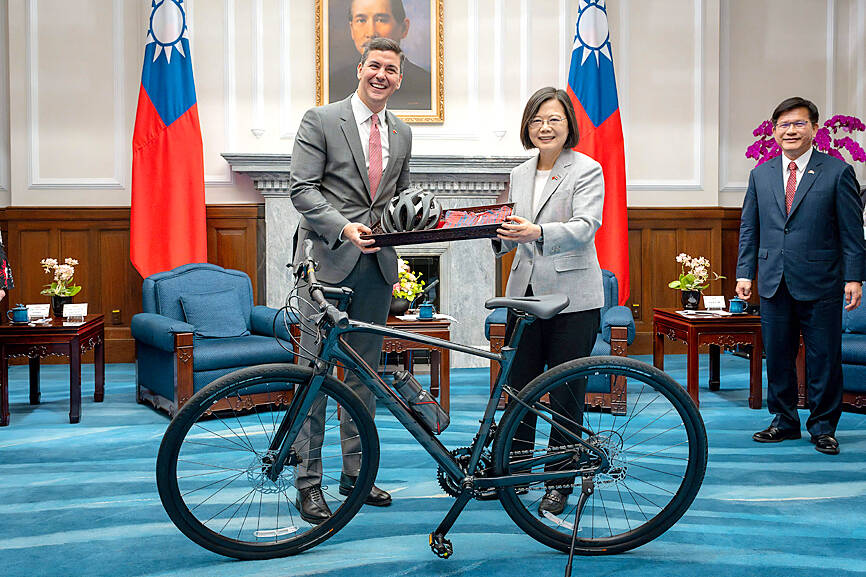Paraguayan president-elect Santiago Pena said during a meeting with President Tsai Ing-wen (蔡英文) in Taipei yesterday that his administration would continue to stand with Taiwan and strive to boost bilateral relations.
Pena, who is scheduled to be sworn in next month, made the pledge at the meeting that included some of Paraguay’s future officials, including foreign minister-designate Ruben Ramirez Lezcano and finance minister-designate Carlos Fernandez Valdovinos.
During a meeting earlier the same day with Vice President William Lai (賴清德), who is the Democratic Progressive Party’s nominee in January’s presidential election, Pena also pledged his “full support” for Paraguay’s diplomatic ties with Taiwan, the Presidential Office said in a statement.

Photo: AFP / the Presidential Office
Maintaining diplomatic relations with Taiwan is in the best interests of Paraguay, Pena said, adding that he would continue promoting bilateral relations based on the 66 years of friendship between the two nations.
The visit by the Paraguayan delegation from Tuesday to Saturday serves to demonstrate that Paraguay and Taiwan would continue to insist on their shared values, ideals and goals, despite facing many challenges, Pena told Tsai at the Presidential Office in Taipei, without elaborating.
“I come to ... reaffirm my commitment, our commitment as Paraguayans to be on the side of the people of Taiwan for the next five years,” he said.
Pena also praised Tsai for “knowing that principles and values are not negotiable.”
Pena said he studied in Taiwan in 1999 and that he was bringing “the love and affection of all the Paraguayan people,” while also extending an invitation to Tsai to visit Paraguay after she leaves office next year.
While thanking Taiwan’s government for its decades-long financial and economic backing of Paraguay, Pena called for Taipei’s continued support as his administration works to reduce poverty and develop the country.
The new administration’s priorities include providing better healthcare and education to young people in Paraguay, and creating 500,000 jobs over the next five years by attracting foreign investment and rolling out public infrastructure projects, Pena said.
Without going into detail, he also called for Taiwan’s assistance with a program that would allow about 200,000 Paraguayans to get loans to improve their living conditions.
Meanwhile, Tsai, who spoke before Pena, said she looked forward to seeing more cooperation between Taiwan and Paraguay in areas such as electric vehicles, food processing and textiles.
In the face of authoritarian expansion, Taiwan and Paraguay should work together with democratic partners to contribute to global peace and stability, she added.
Asuncion is one of the few remaining capitals in Latin America to still recognize Taiwan. Panama, El Salvador, the Dominican Republic, Nicaragua and Honduras have all switched diplomatic recognition from Taiwan to China in recent years.

‘CORRECT IDENTIFICATION’: Beginning in May, Taiwanese married to Japanese can register their home country as Taiwan in their spouse’s family record, ‘Nikkei Asia’ said The government yesterday thanked Japan for revising rules that would allow Taiwanese nationals married to Japanese citizens to list their home country as “Taiwan” in the official family record database. At present, Taiwanese have to select “China.” Minister of Foreign Affairs Lin Chia-lung (林佳龍) said the new rule, set to be implemented in May, would now “correctly” identify Taiwanese in Japan and help protect their rights, the Ministry of Foreign Affairs said in a statement. The statement was released after Nikkei Asia reported the new policy earlier yesterday. The name and nationality of a non-Japanese person marrying a Japanese national is added to the

AT RISK: The council reiterated that people should seriously consider the necessity of visiting China, after Beijing passed 22 guidelines to punish ‘die-hard’ separatists The Mainland Affairs Council (MAC) has since Jan. 1 last year received 65 petitions regarding Taiwanese who were interrogated or detained in China, MAC Minister Chiu Chui-cheng (邱垂正) said yesterday. Fifty-two either went missing or had their personal freedoms restricted, with some put in criminal detention, while 13 were interrogated and temporarily detained, he said in a radio interview. On June 21 last year, China announced 22 guidelines to punish “die-hard Taiwanese independence separatists,” allowing Chinese courts to try people in absentia. The guidelines are uncivilized and inhumane, allowing Beijing to seize assets and issue the death penalty, with no regard for potential

‘UNITED FRONT’ FRONTS: Barring contact with Huaqiao and Jinan universities is needed to stop China targeting Taiwanese students, the education minister said Taiwan has blacklisted two Chinese universities from conducting academic exchange programs in the nation after reports that the institutes are arms of Beijing’s United Front Work Department, Minister of Education Cheng Ying-yao (鄭英耀) said in an exclusive interview with the Chinese-language Liberty Times (the Taipei Times’ sister paper) published yesterday. China’s Huaqiao University in Xiamen and Quanzhou, as well as Jinan University in Guangzhou, which have 600 and 1,500 Taiwanese on their rolls respectively, are under direct control of the Chinese government’s political warfare branch, Cheng said, citing reports by national security officials. A comprehensive ban on Taiwanese institutions collaborating or

STILL COMMITTED: The US opposes any forced change to the ‘status quo’ in the Strait, but also does not seek conflict, US Secretary of State Marco Rubio said US President Donald Trump’s administration released US$5.3 billion in previously frozen foreign aid, including US$870 million in security exemptions for programs in Taiwan, a list of exemptions reviewed by Reuters showed. Trump ordered a 90-day pause on foreign aid shortly after taking office on Jan. 20, halting funding for everything from programs that fight starvation and deadly diseases to providing shelters for millions of displaced people across the globe. US Secretary of State Marco Rubio, who has said that all foreign assistance must align with Trump’s “America First” priorities, issued waivers late last month on military aid to Israel and Egypt, the